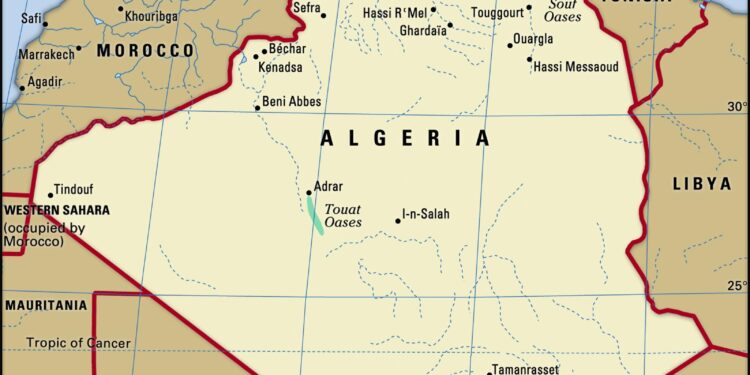Algeria Expels French Diplomats, Signaling a Reversal in Bilateral Relations
In a notable diplomatic setback, Algeria has ordered the expulsion of multiple French diplomats, abruptly halting the recent progress made toward improved relations between the two countries. This action highlights enduring tensions rooted in colonial history and ongoing disputes over migration policies, economic cooperation, and national autonomy. The move emerges amid a surge of nationalist sentiment within Algeria and growing skepticism about France’s role in North Africa. As this diplomatic rupture unfolds, experts will be monitoring its repercussions on bilateral ties and regional geopolitical stability.
Algeria’s Diplomatic Turnaround: Examining the Expulsion of French Diplomats and Its Broader Consequences
Algeria’s recent decision to expel several French officials marks a dramatic shift away from what had been an encouraging phase of rapprochement between Algiers and Paris. This development reflects not only unresolved historical grievances but also Algeria’s determination to reinforce its sovereignty against perceived neo-colonial pressures. The expulsions come after years marked by high-level dialogues aimed at enhancing security collaboration and economic partnerships—efforts that had suggested warming ties.
The fallout from this diplomatic rupture could extend well beyond Algerian-French relations:
- Regional Diplomatic Realignments: Neighboring Maghreb states might reconsider their engagements with France, potentially recalibrating alliances.
- Economic Impact: Industries dependent on French investment risk instability; for instance, sectors like energy infrastructure may face delays or funding challenges.
- Rise in Nationalist Rhetoric: Domestic political discourse may intensify anti-colonial narratives as public opinion rallies behind government actions.
Navigating these complexities will test Algeria’s ability to balance national interests with regional diplomacy while compelling both nations to rethink their future engagement strategies.
Historical Context Meets Contemporary Strains: Understanding Algeria-France Relations Today
The expulsion episode underscores how deeply entrenched historical legacies continue to shape present-day diplomacy between Algeria and France. After decades marked by colonization—spanning over 130 years—the scars left by that era still influence political decisions and cultural perceptions on both sides.
Despite recent attempts at reconciliation through diplomatic exchanges focused on mutual concerns such as security threats and trade enhancement, Algerian authorities framed their latest move as a response to provocations they view as infringements upon their sovereignty. This stance reflects persistent nationalist currents fueled by collective memory of colonial subjugation.
Key elements influencing current dynamics include:
- The Colonial Past: The long period under French rule remains central to Algerian identity politics.
- Sovereignty Assertion: Post-independence efforts emphasize reclaiming control over domestic affairs free from external interference.
- Civic Sentiment Fluctuations: Public attitudes towards France oscillate based on political developments both domestically and internationally.
These factors combine to create an environment where even tentative steps toward cooperation can quickly unravel under pressure from historical grievances.
Strategies for France: Rebuilding Confidence While Navigating North African Geopolitics
In light of Algeria’s decisive action against its diplomats, Paris faces an urgent imperative: restoring trust with one of its most pivotal partners in North Africa. To mend fences effectively, France must adopt multifaceted approaches centered around dialogue, cultural respect, economic partnership, and security collaboration:
- Sustained Diplomatic Engagement: Establish consistent communication channels designed for transparent discussion addressing contentious issues head-on.
- Cultural Exchange Programs: Initiate initiatives celebrating shared heritage while honoring Algerian culture—such efforts can soften tensions through people-to-people connections.
- Economic Cooperation Projects: Prioritize joint ventures that bolster local economies—for example renewable energy projects or technology hubs—to demonstrate commitment beyond rhetoric.
- Tactical Security Alliances: Collaborate closely on counterterrorism operations given mutual interests in regional stability across Sahel countries like Mali or Niger.
Additionally, understanding shifting power dynamics is crucial as other global actors increase involvement across Africa:
- Pursuing Soft Power Influence: Expand scholarship programs targeting young Algerians which foster goodwill among future leaders.
France should also support multilateral peace initiatives where Algeria plays key roles (e.g., Libya conflict mediation), while reinforcing partnerships with neighboring Maghreb states such as Tunisia or Morocco — presenting united fronts against isolationist tendencies triggered by bilateral strains.
Conclusion: Reflecting on the Shifting Landscape Between Algeria & France
Algeria’s expulsion of French diplomats represents more than just a temporary setback—it signals deep-rooted challenges embedded within Franco-Algerian relations shaped by history yet complicated further by contemporary geopolitical realities.
Following promising signs earlier this year—including increased trade talks valued at over $3 billion USD annually—the sudden deterioration illustrates how fragile progress remains when confronted with unresolved past wounds.
As both nations reassess priorities amid rising nationalism in Algiers alongside strategic recalibrations in Paris influenced by broader global competition for influence across Africa (notably involving China’s expanding footprint), observers anticipate continued volatility.
This evolving scenario demands close attention from policymakers worldwide since outcomes here will likely reverberate throughout Mediterranean geopolitics—and impact international efforts toward peacebuilding & sustainable development across North Africa.















How Trump’s Tariffs Transformed a Mexican Businessman into a Grateful Ally